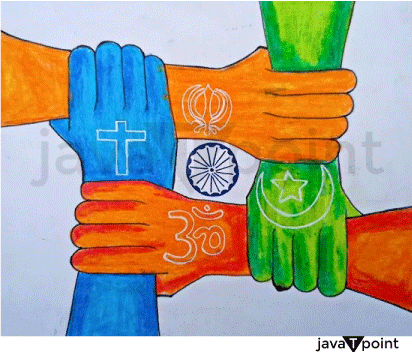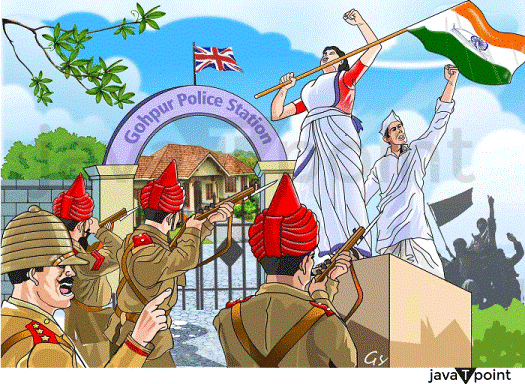Speech on Unity in DiversityIndia is a country with different races, cultures, religions, and languages. It is known as the land of unity in diversity, where people have different ways of life and lifestyles and practicing different religions are able to live in harmony. They even speak different languages and have different traditional dresses. In spite of all of this, the people of India live in the common bond of the human race and brotherhood. Unity in diversity is the main characteristic of India that makes its name famous throughout the globe. 
It is generally accepted that individuals in India are taking a step towards the ancient Indian tradition of taking in and accepting that they are absorbing the natural world. The unity in the diversity in the majority of aspects of society has turned into an element of power and prosperity across the nation. The people of different religions worship using diverse methods by respecting their unique customs and practices, demonstrating fundamental unity. Unity in diversity fosters a sense of brotherhood and friendship across people, regardless of diverse cultures. India is renowned due to its extensive cultural heritage as a result of its inhabitants of different religious beliefs. People who are part of different religions and cultures have different ways of life, which are based on their beliefs and interests. This also leads to an increase in different professional fields like art, music, dance, and drama (classical or folk, etc.). Traditions of the spiritual side of the inhabitants create greater piety for the other. The Ancient Indian Scriptures (Vedas and Upanishads) are excellent sources of spiritual knowledge for individuals. There are maharishis, rishis, priests, yogis, fathers, etc., in most religions, each with their own traditions of spirituality as per their respective Scripture. Diversity in Political Affiliation and CultureIf we take a look at the new nations, we will find diversity in the political and cultural heritage and even in sports. Every country has a distinct history, mythology, and cultural background that is reflected in literature. Every state is unique in particular cultures and values and has an individual identity. When viewed at a single glance, it displays its people's diversity but isn't united. India is one of the oldest civilizations in the world and has diverse ethnic groups that practice diverse religions and cultures. As a multi-ethnic civilization, India is an area of many languages and has more than 1650 dialects and regional accents. In spite of different religions, cultures, and even languages, the individuals of India share a common bond of love for one another. A vital harmony in the diversity of India is what makes India an excellent example of an era of cultural diversity. Every part of India, ranging from Jammu and Kashmir up to Kanyakumari, has its own way of life and culture. From the beginning, the people of India have been a part of the same community and are respectful of the diversity of religions and traditions. Unity in diversity is an essential characteristic of this beautiful country and brings people together in the bonds of human rights and peace. Fight for Freedom- A Great Unity in Diversity Example of IndiaUnity in Diversity is a phrase that Jawaharlal Nehru coined in light of India's freedom struggle. The unique struggle for freedom illustrates how to achieve Unity in Diversity, as the entire nation was on the same stage with different castes and faiths. The top leaders of the Indian libertarian movement Mahatma Gandhi, Pt Jawaharlal Nehru, Mohammad Ali Jinnah, Gopal Krishna Gokhale, Maulana Abdul Kalam Azad, and Sardar Vallabh Bhai Patel used the phrase of Unity in Diversity to ensure that the struggle for freedom was to be a success. 
The narrative of the unity of India in diversity is remarkable. It sends strong messages that show India as a nation is higher than any specific faith or tradition. At present, about 1.4 billion people are living together with love and peace. The diverse culture of India can be seen in the past. Moguls, English, and many other outside forces controlled India at different times and brought their traditions and cultures with them. Indians, tied by the love of their hearts, have always stood up to any culture and welcomed everyone with open arms. Unity in diversity in India is justified by the fact that there are people who have different opinions on life, religion, economic, and political systems that are creating a nation of civilization through their views and moral conduct. Hindus have been worshipping saints, sages, religious preachers, philosophers, and other religious leaders from the beginning of time. As an example, it is said that the Sufi saint Khwaja Moinuddin Chishti temple in Ajmer has similar respect to it as the Vaishno Devi Shrine in Jammu. With the largest population in the world, and its people belonging to different religions and ethnicities, India is today the most secular nation with a unique culture of harmony in diversity. With the exception of a handful of instances in which the people live in absolute harmony despite cultural barriers, languages, clothing, food, the color of their skin, caste, religion, and customs of social life. Who doesn't realize that diversity has contributed to the strength of India's economy and political life? The country's rich historical and cultural heritage is for all the residents of the nation. People are proud of their heritage. The differences in opinions, ways of living, and beliefs are strengths instead of weaknesses. They represent a broad spectrum of opinions, depth of tolerance, and even energy. In this world, people can have differing or even opposing views on religious beliefs, the way of life, and social structures, as well as growing economics, the system of government, and methods of spiritual advancement and redemption. Yet, all belong to one nation, a country that is Bharat. This prediction of total unity prevents trapping without allowing weak and contradictory arguments. Unity in a variety of ideas, cultures, and beliefs is the principal driving force of Indian nationalism. Indian Spiritual Values Always United the IndiansThe moral and spiritual beliefs of India have always remained identical, regardless of many cultural and political changes. They bolstered India's vital harmony. The story is endless to tell daily; Hindus were profoundly religious and spiritual. They have always given the top place and importance to the spiritual evolution and growth of their soul. Their primary and ultimate objective of existence is the liberation of the soul, also known as nirvana or moksha. The great saints, rishis, preachers, and philosophers have always been a part of the vast and diverse Indian cultural heritage, including the Vedas Gita, Ramayana, Kuran, Guru Granth Sahib, Bible, etc. They have great respect from individuals from all categories and sections of the nation. They take part in celebrations with a lot of enthusiasm. The diverse cultures and beliefs are very well integrated into the Indian culture, and they have made stronger its unification and integrity. The rulers, the princes, the kings, and religious dynasties changed, but India remained one and united. All of them were well-integrated into the modern world and its heritage. Incorporation, adaptation, and integration were characteristics of Indian culture and unity. Specific selfish, corrupt, culturally indifferent individuals have attempted to destroy the cultural unity of India. They are currently trying to undermine the culture of unity in India. Yet, the timeless connection of family reveals that the efforts of these people have been unsuccessful. The socio-economic growth of India is dependent on its integration into the world and its capacity to hold incredible variety within it. The revered figurehead of liberty Mahatma Gandhi had a significant contribution to linking the people of diverse religions and different cultures in one union of affection and harmony. Gandhi Ji came from a spiritual Hindu family; however, he was equally tolerant of different religions and admired the fundamentals of every religion. Gandhi Ji dreamed of a secular India and put in all efforts to achieve his vision. The unification of the masses in Libertarian movements was the primary weapon that forced the British Empire to free India from the oppression of the Britishers. Spiritual belief and its cultural influence played a crucial role in uniting the Indian people with a sense of unification. Hinduism is the religion that makes up large proportions of Indians and is either an apex of foreign cultural traditions or has significantly influenced the culture. Freedom of speech has been the most substantial nest evidence of India's unification in diversity. Each of these aspects is connected to the unity of India's culture. In India, there are 29 states that have their own language and cultural traditions. However, in this diverse world, all Indians are united in their nation. Diversity can take many forms. It could be in the form of diverse religions or castes, sexualities, or colors. Take any organization; it will have individuals from various states, countries, colors, and, most importantly, languages working together. Diversity gives us the chance to learn about different religions, cultures, and also their celebrations. If people are able to adjust and form a harmonious relationship, it will be impossible for conflict to occur. The primary reason conflicts arise from diversity is due to political conflict. The way we organize the world creates disputes. The people we choose to lead are examples. When they are elected, they attempt to split religious groups in order to gain more votes. If we embrace diversity and cherish our fellow human beings without considering the religion, caste, and ethnicity of other people, then no one can cause us to break our bonds. This is why we are known as the land of Unity in Diversity. ConclusionOur nation has cultivated unity in diversity as one of our strengths. From the outside, it is apparent to be an eclectic mix of different components. Yet, it's a homogeneous unit like a chemical compound. The most striking instance of unity is in the makeup of the Council of Parliament. Political parties representing diverse regions of the nation merge (forgetting their respective political beliefs) to create a new government. We must remember this as our strength and should not let any external force make us believe otherwise.
Next TopicSpeech on Value of Time
|
 For Videos Join Our Youtube Channel: Join Now
For Videos Join Our Youtube Channel: Join Now
Feedback
- Send your Feedback to [email protected]
Help Others, Please Share










